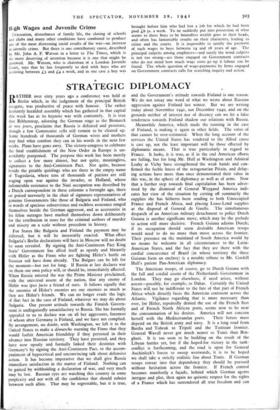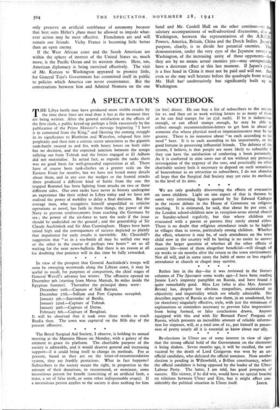STRATEGIC DIPLOMACY
RATHER over sixty years ago a conference was held at Berlin which, in the judgement of the principal British delegate, was productive of peace with honour. The rather hesitantly heralded assembly which has gathered in that capital this week has as its keynote war with contumely. It is true that Ribbentrop, adorning the German stage as the Bismarck de nos fours, proclaims that Russia is defeated and prostrate, though a few Communist cells still remain to be cleared up. Some hundreds of thousands of German wives and mothers may find what comfort they can in his words in the next few weeks. Plans have gone awry. The victory-congress to celebrate the final establishment of the New Order in Europe is un- avoidably postponed. The purpose this week has been merely to collect a few more almost, but not quite, meaningless, signatures to the Anti-Comintern Pact. Not quite, because beside the pitiable quislings who are there in the empty name of Yugoslavia, where tens of thousands of patriots are still waging open war against the invader, or Holland, whose indomitable resistance to the Nazi occupation was described by a Dutch correspondent in these columns a fortnight ago, there sat poised nervously in the chair of signature representatives of genuine Governments like those of Bulgaria and Finland, who in words of specious subservience and reckless assurance ranged themselves beside the German aggressor, and as accessories in his felon outrages have marked themselves down deliberately for the retribution in store for the criminal authors of murder and misery on a scale without precedent in history.
For States like Bulgaria and Finland the payment may be deferred, but it will be inexorably exacted. What effect Bulgaria's Berlin declarations will have in Moscow will no doubt be soon revealed. By signing the Anti-Comintern Pact King Boris' Government has allied itself as openly and blatantly with Hitler as the Finns who are fighting Hitler's battle on Russian soil have done already. The Bulgars can be left for the moment—but not for long. If Russia at last declares war on them our own policy will, or should be, immediately affected. When Russia entered the war the Prime Minister proclaimed, with the universal assent of the nation, that any enemy of Hitler was ipso facto a friend of ours. It follows equally that the enemies of Hitler's enemies are our enemies as much as they are Hitler's friends. We can no longer evade the logic of that fact in the case of Finland, whatever we may do about Bulgaria. Our present attitude towards the Finnish Govern- ment is undisguisedly unsatisfactory to Russia. She has formally appealed to us to declare war on all her aggressors, foremost of whom after Germany is Finland, and we have not complied. By arrangement, no doubt, with Washington, we left it to the United States to make a demarche warning the Finns that they would forfeit American friendship if they persisted in their advance into Russian territory. They have persisted, and they have now openly and formally linked their destinies with Germany's by signing the Anti-Comintern Pact, to the accom- paniment of hypocritical and unconvincing talk about defensive action. It has become imperative that we shall give Russia immediate satisfaction in the matter of Finland. Nothing can be gained by withholding a declaration of war, and very much may be lost. Russian eyes are watching this country in some perplexity and not with all the confidence that should subsist between such allies. That may be regrettable, but it is true, and the Government's attitude towards Finland is one reason. We do not unsay one word of what we wrote about Russian aggression against Finland last winter. But we are writing today about November 1941, not December 1940, and on- the grounds neither of interest nor of decency can we let a false tenderness towards Finland shadow our relations with Russia.
Meanwhile America, which made the running in the case of Finland, is making it again in other fields. The value of that cannot be over-estimated. When the long account of the services the United States has rendered to the Allied cause is cast up, not the least important will be those effected by diplomatic means. That is true particularly in regard to France. It looks, it is true, as if in the end American efforts are failing, but for long Mr. Hull at Washington and Admiral Leahy at Vichy have strengthened the weak hands and con- firmed the feeble knees of the octogenarian Petain, and delay- ing actions have more than once demonstrated their value in this war, in the sphere of diplomacy as well as of arms. Now that a further step towards final capitulation has been adver- tised by the dismissal of General Weygand America indi- cates her view of the situation by cutting off summarily the supplies she has hitherto been sending to both Unoccupied France and French Africa, and placing Lease-Lend supplies at the disposal of General de Gaulle. The simultaneous despatch of an American military detachment to police Dutch Guiana is another significant move, which may be the prelude to action still more decisive. French Guiana adjoins Dutch; if its occupation should seem desirable American troops would need to do no more than move across the frontier. Their presence on the mainland of South America would by no means be welcome in all circumstances to the Latin- American States, and the fact that they are there with the cordial concurrence of Brazil (in whose territory the three Guianas form an enclave) is a notable tribute to Mr. Cordell Hull's patient Pan-American diplomacy.
The American troops, of course, go to Dutch Guiana with the full and cordial assent of the Netherlands Government in London. They may go elsewhere, if need arises, without assent—possibly, for example, to Dakar. Certainly the United States will not be indifferent to the fate of that part of French Africa.-which directly faces the American continent across the Atlantic. Vigilance regarding that is more necessary than ever, for Hitler, repeatedly denied the use of the French fleet and of French North African ports, seems now to be near the consummation of his desires. America will not concern herself with the Mediterranean ports. Their future must depend on the British army and navy. It is a long road from Bardia and Tobruk to Tripoli and the Tunisian frontier. General Wavell never got much nearer to Tunis than Ben- ghazi. It is too soon to be building on the result of the Libyan battles yet, but if the hoped-for victory in the tank- conflict is forthcoming, and the road is open for General Auchinleck's forces to sweep westwards, it is to be hoped we shall take a strictly realistic line about Tunis. If German troops retreat into that dependency they should be pursued without hesitation across the frontier. If French control becomes manifestly a facade, behind which German agents intrigue and plot, then again no quixotic respect for the rights of a France which has surrendered all true freedom and can only preserve an artificial semblance of autonomy because that best suits Hitler's plans must be allowed to impede what- ever action may be most effective. Frenchmen are and will remain our friends. Vichy France is becoming little better than an open enemy.
If the West African coast and the South American are within the sphere of interest of the United States so, much more, is the Pacific Ocean and its western shores. Here, too, American diplomacy is being exercised effectively. The visit of Mr. Kurusu to Washington appeared to promise little, for General Tojo's Government has committed itself in public to policies which America can never countenance. But the conversations between him and Admiral Nomura on the one hand and Mr. Cordell Hull on the other continue—to th salutary accompaniment of well-advertised discussions, also a Washington, between the representatives of the A.B.C.D Powers, America, Britain, China and the Dutch Indies. Japan purpose, clearly, is to divide her potential enemies. Th demonstration, under the very eyes of the Japanese envoys Washington, of the increasing unity of those opponents —fa they are by no means actual enemies yet—may unexpected) have a deterrent effect at this last moment. If Japan's pric is a free hand in China it must not be paid and will not. Bu even so she may well hesitate before the quadruple front which Mr. Hull has" unobtrusively but significantly built up in Washington.



























 Previous page
Previous page